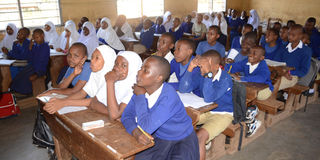Free education policy goes to test as Std VII pupils sit exam

Standard Seven pupils at Uhuru Primary School in Moshi attend a class as part of their final preparations yesterday for this year’s Primary School Leaving Examination, which begins nationwide today. PHOTO | DIONIS NYATO
What you need to know:
- Exam candidates from public schools involve the first batch of beneficiaries of the free education policy that came into effect in 2016 after it was endorsed in 2014
Dar es Salaam. Some education stakeholders yesterday expressed varied expectations over the countrywide Primary School Leaving Examination (PSLE) starting today and involving the first batch of free education beneficiaries in public primary schools.
The free education policy, passed in 2014, came into effect in 2016 exempting fees to children enrolled in public schools from primary to lower level of secondary education (O-Level).
Candidates from 17,943 Tanzania Mainland schools were admitted for primary level education that year and are completing seven years of study this year by the sitting two day-examination starting today.
A total of 1,386,592 pupils were enrolled for Standard One in 2016, but only 1,384,340 have been registered for this year’s examination.
That means 2,252 pupils will not sit for the exam for various reasons.
The National Examinations Council of Tanzania (Necta) said yesterday of the 1,384,340 candidates, 1,325,433, being 95.74 percent will sit in Kiswahili examinations, while 58,907 others, the equivalent of 4.26 percent, will take the examination in the English language.
Furthermore, Necta said the 2022 candidates registered for PSLE increased by 252,256, which is equivalent to 22.28 percent as compared to 1,132,084 candidates registered in 2021.
Yesterday, different education stakeholders shared their varied expectations.
While some stakeholders said private schools will maintain dominance among top performers due to having a better study environment, others were of the view that more needs to be done to improve provision of quality education.
A parent whose child will sit for the exam, Mr Juma Nzali, said free education relief provided by the free education policy enabled parents to invest in alternative ways of improving children’s learning.
“Removing the burden of school fees paved the way for me to focus on buying additional books for my children. This relief will definitely be reflected in the children’s examination results,” he told The Citizen over the phone.
The parent whose pupil studied at Shelui Primary School in Iramba District, Singida Region said the introduction of the free education policy didn’t aim at excluding parents from supporting education given to their children.
“The acquisition of extra books and other needs should be done by parents to complement government efforts and help our children acquire the best in their learning. That is what I have been doing as I strongly believe in the vibrant partnership between the government and parents,” he said.
But, Mr Nicodemus Shauri from the Tanzania Education Network (Ten/Met) said nothing much should be expected because no huge changes in investment has been recorded since 2002 when grants were introduced in schools.
“The decision reduced money and materials channelled to schools. It also led to less teaching aids and reduced motivation for teachers. Infrastructure remains unimproved, therefore no miracle should be expected,” he opined.
According to him, the finalization of the ongoing policy and curriculum review is expected to introduce 10 years for pupils to spend in basic education, something that will ultimately scrape the PSLE.
“Obviously, pupils from private schools will outperform their public schools counterparts. We shouldn’t expect good results out of poor investment,” he noted.
For his part, Dr Amos Mbonde, an education expert based in Dar es Salaam said the government has been striving to improve the teaching and learning environment, noting however that stakeholders’ cooperation was vital in realization of that endeavour. “Economic disparities cannot allow all our children to be taken to private schools. Both the government and stakeholders should work hard to achieve the common goal,” he advised.
Speaking in Dodoma during the signing of nutrition supervision contracts with regional commissioners last week President Samia Suluhu Hassan said her administration has released Sh160 billion for construction of 8,000 classrooms to accommodate students who will be joining Form One in January 2023.
“Regional Administrative Secretaries (RAS) and District Commissioners (DCs) are supposed to efficiently supervise the councils using the force accounts,” she instructed.




